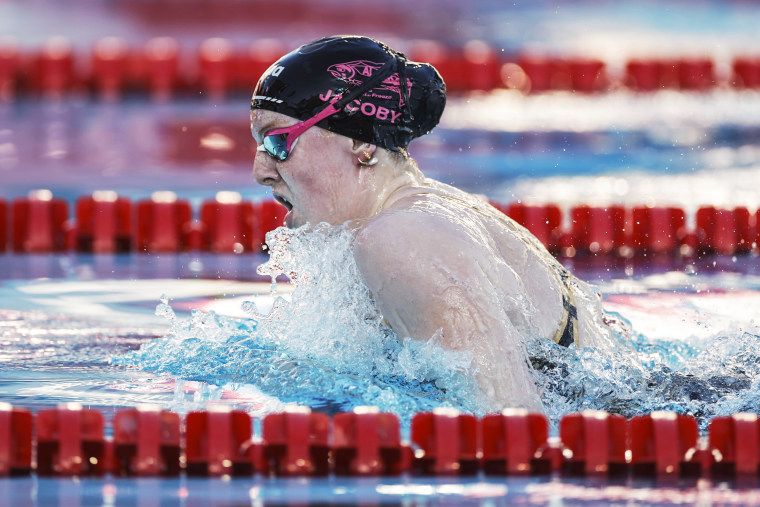U.S. Olympic swimmer Lydia Jacoby was on top of the world.
At the 2020 Tokyo Olympic Games, she won the gold medal in the 100-meter breaststroke after having recorded the fastest time ever achieved by a female American swimmer (1:04.95).
But shortly after she returned home to Alaska, Jacoby, then 17, discovered in real time how her life had changed from being an obscure athlete to being famous worldwide.
In a conversation on NBC's “My New Favorite Olympian” podcast, Jacoby detailed the challenges of experiencing depression.
“After the Olympics, you’re getting pulled so many different directions,” she said. “I’m very much a people pleaser. So I was like, ‘I want to do this for everyone.’ And I felt, like, at a point I’d given every piece of myself away and I had nothing left for myself.
“I’ve had points where I am severely depressed,” she added. “And there will be weeks where I just don’t want to live my life anymore or I am just in bed all the time.”
Jacoby’s newfound celebrity included people treating her differently, causing her to question their motives.
“You definitely notice that there’ll be some people who suddenly want to start posting [photos] with you more or hanging out with you more,” she said. “I developed some pretty serious trust issues, especially meeting new people. ‘Does this person actually want to get to know me? Or are they just excited that I’m an Olympian and trying to get to that?’ It really kind of hindered me from creating more friendships or preserving old ones.”

Jacoby’s struggle with mental health even carried over to the place she would often seek refuge: the swimming pool. In her words, she started to resent swimming as her depression spiraled after she lost a sense of routine when she graduated early from high school.
“I was swimming, but I just was kind of half-assing every practice, like not fully in it,” she said. “I really fell out of love with the sport for a while. I considered quitting.”
Jacoby’s experience with depression after competing is not uncommon. Prominent Olympians, including Missy Franklin, Simone Biles and Natalie Coughlin, have shared similar stories about mental health.
According to performance psychologist Michael Gervais, elite athletes can struggle to find their purpose after having had clear objectives heading into an Olympics.
“When [competition] ends, the question begs itself: ‘Well, now what? Who am I? And now what?’ Those are the two questions that come up that can leave a deep vacuum,” Gervais said. “And there is a post that takes place that can feel just like normal depression. And if it lasts too long, we can move into a depressive state that is something that needs to be treated and worked through.”
It appears a change of scenery has helped Jacoby on her journey.
In 2022, she moved from her small hometown and enrolled at the University of Texas at Austin. That gave her the opportunity to acclimate as a normal college student and no longer endure being the center of attention.
“I think I was just ready for something new,” she said. “I had really reached the pinnacle of sports. I just was kind of lost on where to go next. And so I think the move to Texas was a great one in that regard.”
She also embraced going to therapy, acknowledging that identifying her mental health struggles was key.
“I hadn’t accepted that I was feeling any sort of depression or anything,” Jacoby said. “I just feel like acceptance was the biggest piece for me, just realizing that I was struggling with depression and I was struggling with some other things. That help was actually something that I needed.”

Now Jacoby — competing this weekend in the U.S. Olympic Trials in the 100-meter breaststroke — is seeking to help others who may be struggling with mental health by sharing her story.
When she accepted USA Swimming’s Perseverance Award at last year’s Golden Goggles ceremony, she revealed her battle to those in attendance. Jacoby said multiple people came up to her after the speech to say how inspiring her words were.
For Jacoby, if sharing her story results in helping others, it makes everything worthwhile.
"I don’t share my stories about mental health just to put them out into the universe,” she said. "To me, if just one person reaches out and gets help from hearing what I went through, that for me means the world."
If you or someone you know is struggling or in crisis, help is available. Call or text 988 or chat at 988lifeline.org.

